Water damage to your properties is one of the most difficult issues to solve. It can bring so much inconvenience to the point that it can directly interfere with your daily activities. There are safety and health hazards involved as well. Here at StormPros, we take water damage seriously. In today’s blog post, we’ll share with you some valuable water damage restoration tips. We believe that it’s important to know what to do in emergency cases like this.
Common Causes of Water Damage
First off, let’s identify the possible causes of water damage. Spotting the possible sources will help you become more aware of your property. While there are uncontrolled instances, familiarity and preparedness are keys to a well-managed water damage situations. One of our water damage restoration tips is to recognize problems even before they become unmanageable and destructive.
Natural Disasters
Number one on the list would be extreme weather-related issues. Natural disasters such as hurricanes, super typhoons, flash floods, and heavy snowstorms could be the reason for water penetration in areas that should remain dry. While it’s true that you can only do so much in unexpected situations, it pays to prepare ahead of time. Setting your expectations is the first step in order for you to come up with sound decisions following the inevitable circumstances.
Leaking Pipes
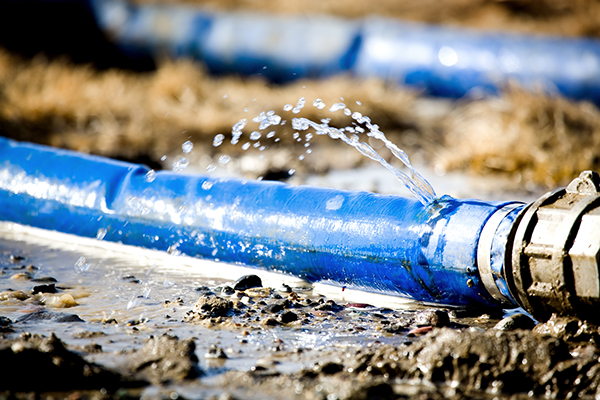
Water leaking from the pipes can cause further damage to its surrounding areas.
From severe natural calamities down to the most common water damage source. Leaking or bursting pipes in your kitchen, bathroom, or elsewhere shouldn’t be ignored. Even if it seems like they don’t need urgent intervention, they actually do. No matter how minor you think the damage is, it can blow up and affect a wide area of your property until it becomes too complicated to fix.
Overflowing Toilet, Tub, or Sink
When water backs up due to a sewer system failure, it can cause critical areas to clog or overflow. These incidents do not only stir panic but could also be destructive. Water can spill over the walls, on the floor, and other areas of your house or building.
Malfunctioning HVAC and Other Appliances
Heating, ventilating, and air conditioning units or HVAC are also considered as sources of water damage. Lack of proper maintenance can cause moisture to build up. This leads to recurring leakage and can also trigger the growth of molds. Similarly, other appliances such as refrigerators, washing machines, dishwashers, etc. can cause water damage as well. As they deteriorate over time, their tubes and hoses can cause leaks. Hence, it’s advisable to change worn out parts as needed.
Water Damage Aftermath
To give you a clearer view of what really happens during and after water damage, here’s a quick rundown of what to expect. Note that it can get serious, thus, one of our water damage restoration tips is to act fast with full urgency.
Structural Damage
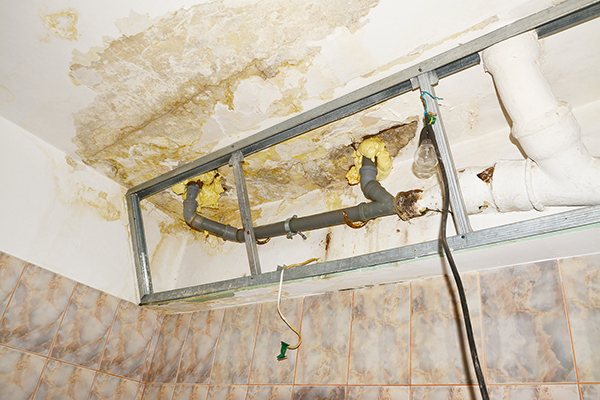
Water damage in the bathroom ceiling, which exposes pipes to dirt. There are visible water stains as well.
Physical damage is probably the most obvious consequence of water damage. It can cause discolorations, stains, warping, and deterioration in different areas of the property. More than the outer appearance that affects its aesthetics, it can compromise the overall structural integrity. Failure to treat water damage can cause beams, ceilings, and walls to collapse sooner. This also drives down your property’s resale value.
Health Problems Due to Mold and Fungal Growth
Damp and moist areas are the favorite breeding ground of plants like molds and fungi. When they proliferate, these organisms can pollute the air that circulates in your property. In the worst cases, they can cause difficulty in breathing, coughing, nasal congestion, asthma particularly in infants and children, and other hazardous health complications.
Water Contamination
When pipes and sewage systems are exposed, it can attract dirt and other life-threatening bacteria like E. coli which are frequent after flooding situations. These can cause diseases that will worsen your living conditions. Hence, as part of our water damage restoration tips, have all your pipelines and sewage systems regularly inspected by professionals.
Destruction of Valuable Possessions
Water penetration can create permanent damage to your valuables. It can destroy expensive wood furniture, appliances, electronics, devices, office equipment, and other priced possessions.
Water Damage Restoration Tips: Dos and Don’ts
Every step you undertake is crucial because it can either mitigate the issues or inflict more damage to property. To guide you further, here are some of the basic water damage restoration tips for you. These are the important dos and don’ts in undoing water damage so that you won’t put yourself into more risks.
Dos…
Contact a Water Damage Restoration Expert
There are specific tools and equipment that professionals use in order to completely dry wet areas. They can also perform a total inspection to assess the problems and then recommend the appropriate treatments.
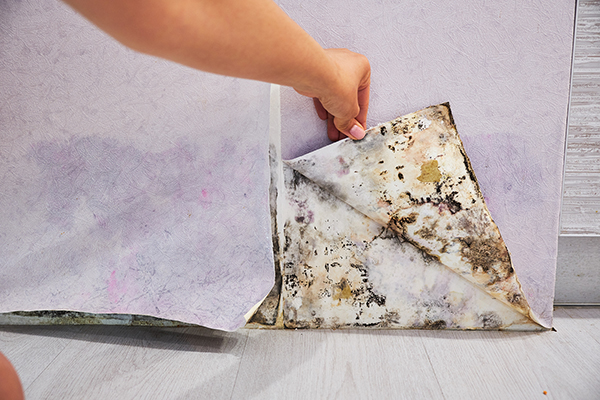
Professional water damage restoration workers are trained to discover issues not keen to ordinary eyes.
Beware of Animals or Insects on the Loose
Pooled or stagnant water can become a possible hide-out of animals such as snakes and rodents as well as a breeding ground for disease-carrying insects.
Perform Visual Inspection
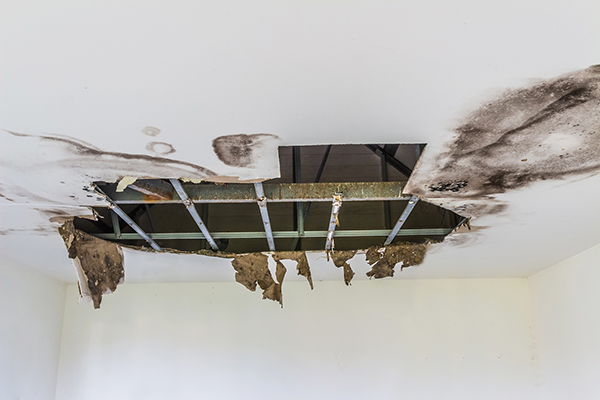
The ceiling has already been affected by the leakage coming from the roof.
If you suspect water-related issues, visually inspect the source of the problem. However, it is always best to seek professional assistance for your own safety. In the course of inspecting your property, you are prone to accidents due to slippery floors or falling objects.
Turn-off Power Supply
To avoid electricity-related accidents, it’s better to switch off the power supply until a water damage expert reaches your area.
Recover or Move Valuable Items
The goal is to prevent the damage to spread any further. To make this happen, find valuable items and secure them in dry areas or move them in a different place temporarily. For instance, recover high-value paintings, art pieces, photos, documents, etc.
Don’ts…
Use a Regular Vacuum to Drain or Extract Water
As we have mentioned above, there are very specific types of equipment used in drying floors, wall, and other parts of the property. Using a regular house or office vacuum will not do the job. Worst, these ordinary vacuum units may become permanently damaged in the process of trying to clear the water.
Turn-on Appliances
Some parts of your appliances (televisions, ovens, refrigerators, etc.) may still be wet even if it seems dry on the outside. Turning them on immediately without waiting for it to completely dry will become a possible cause of irrevocable damage.
Delay Water Damage Restoration Services
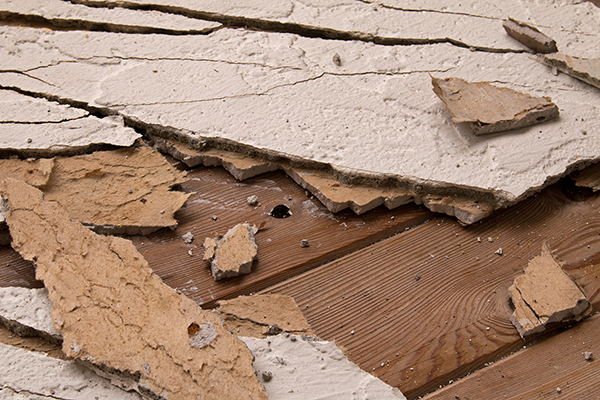
Parts of the wall has already fallen off due to water damage.
No matter how minor your water damage problem is, you should never delay proper restoration services. If you spot signs of water damage, call a licensed service provider immediately.
Conclusion
Water damage can change your life entirely. However, you can always do something to save your property. Bring back its natural beauty and stability by consulting a water damage restoration expert. If treated properly, you get higher chances of reverting the negative results and putting a stop to more serious issues.
Prioritize your safety by being a proactive property owner. When you see warning signs that point to water damage, have a professional look into it right away. If a destructive weather has passed, do the same. Get in touch with experts to prevent more damages and to solve the problems at hand.
If you need more water damage restoration tips, StormPros is here to help. Our team is equipped with the expertise to handle emergency situations including water damage. Contact us at 214-227-2763 to put an end to your water-related problems.

Recent Comments